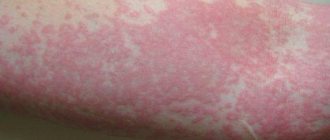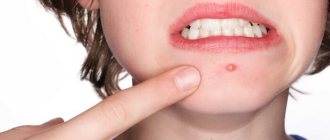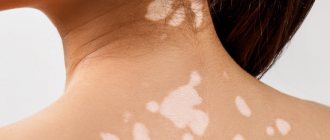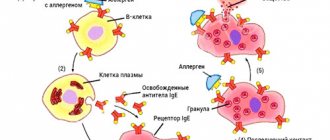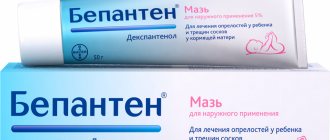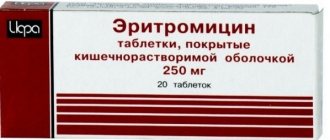Allergic rhinitis is radically different from a runny nose, which occurs with viral infections. With this disorder, inflammation develops due to an overly vigorous immune response to an irritant that has reached the mucous membrane. Most often, the problem is provoked by allergens that come in the air, and therefore the body cannot cope with the problem without treatment, since the irritant acts constantly for a long time. When treating the disease, drops for allergic rhinitis are widely used, which not only make breathing easier by relieving nasal congestion, but also help eliminate the main unpleasant symptoms of the pathology. The idea that a disease is harmless is a deep misconception that can seriously undermine your health. It is not only possible to treat allergic rhinitis, but it is absolutely necessary.
Allergic rhinitis is a fairly common pathology that can appear at any age in both sexes. The maximum number of patients occurs in the preschool period, when the child’s body is actively confronted with various new stimuli and learns to respond to them adequately. It is wrong to think that the baby will outgrow such a problem. The disease must be treated, otherwise it will become chronic. If therapy is carried out, the disorder will go away and may no longer appear at all, since the body will respond correctly to the irritant substance. In adults, allergic rhinitis, as a rule, does not go away completely and recurs periodically under the influence of a substance that is not tolerated by the body. All allergic rhinitis is divided into seasonal and year-round. The first are those that occur due to exposure to seasonal allergens, such as pollen and plant seeds, and the second are those that are constantly present, like the irritant that causes them. Most often, year-round rhinitis appears due to dust, wool or harmful emissions from production in the area of residence.
What drops are used in treatment
When treating the disease, nasal drops of several categories are used. What a particular patient needs is determined only by the doctor after assessing the patient’s condition. When prescribing treatment, the patient’s age and general condition must be taken into account. Drops for allergic rhinitis are formulations that are not as common and numerous as sprays, but still deserve attention. All drugs are divided into four categories:
- antihistamine nasal drops - their action is aimed directly at eliminating the allergic reaction to the nasal mucosa. These remedies are effective and can not only relieve the symptoms of the disease, but also prevent its development in the case of seasonal rhinitis. To do this, they are used for preventive purposes during the presence of the allergen, starting several days before the expected date of its appearance;
- reducing the production of histamine - these drugs help prevent the occurrence of allergies, but they are not effective enough to treat already developed rhinitis. Drops are prescribed primarily to prevent exacerbations of seasonal rhinitis, and they are a prophylactic agent;
- hormonal anti-inflammatory - they have a less aggressive effect on the body than systemic drugs in this category, and at the same time they allow you to quickly eliminate swelling of the mucous membrane and relieve its inflammation, which is necessarily present in allergic rhinitis. These medications may not be prescribed to everyone and have many contraindications;
- vasoconstrictors - prescribed for emergency relief of swelling of the mucous membrane. They can only be used for a short period, as otherwise addiction to them may occur, which is an extremely negative phenomenon. This category of drops is prescribed only as an adjuvant in complex therapy. Old generation drugs can be used without harm for no more than 5 days, and new ones for up to 7-10 days.
It is not uncommon for doctors, in addition to drops for allergic rhinitis, to also prescribe systemic medications that speed up the process of eliminating the allergic reaction. Such drugs combine well with products for topical use and in most cases do not cause a negative reaction from the body.
Combination therapy for allergies
Treatment of allergies, including allergic rhinitis, involves an integrated approach that uses sprays for allergic rhinitis in combination with anti-inflammatory nasal medications (sprays or drops for allergies or allergic rhinitis in the nose), as well as eye drops and glucocorticoids - depending on the doctor's orders.
The decision on the form of release of the antihistamine and the combination of drugs remains with the doctor and is based on individual characteristics - the severity of the reactions, the age of the patient, etc. Particular care should be taken when choosing a drug complex and allergy spray for the treatment of rhinitis in children.
The information in this article is for reference only and does not replace professional advice from a doctor. To make a diagnosis and prescribe treatment, consult a qualified specialist.
LITERATURE:
- Nenasheva N.M. Therapy for allergic rhinitis: which antihistamine to choose? Federal State Budgetary Educational Institution of Further Professional Education RMANPO of the Ministry of Health of Russia, Moscow. Russian medical journal from 05.20.2015 (9): 514.
- Hideyuki Kawauchi, Kazuhiko Yanai, De-Yun Wang et al. Antihistamines for allergic rhinitis treatment from the viewpoint of nonsedative properties. International Journal of Molecular Sciences. 2022 Jan; 20(1):213. Hideyuki Kawauchi, Kazuhiko Yanai, De-Yun Wang, et al. Antihistamines for the treatment of allergic rhinitis in terms of non-sedative properties.
Antihistamine drops
Almost all drops with an antihistamine effect have general contraindications for use. Drugs from this category are not prescribed for therapy in the following cases:
- age less than 15 years;
- pregnancy period;
- breastfeeding period;
- the presence of atrophic rhinitis;
- diabetes;
- atherosclerotic changes in the vessels of the nasal mucosa;
- drug intolerance.
Drops against allergic rhinitis are one of the most popular means for treating the problem in adults. They allow you to get rid of all the main manifestations of pathology, not only eliminating swelling, but also stopping the flow from the nose. It will not be possible to cure the disease completely without the use of systemic antiallergic drugs, but antihistamine drops can significantly alleviate its course.
The most popular drugs in this category are the following:
- Sanorin Analergin is a popular remedy that effectively stops nasal flow and eliminates swelling. Drops also help get rid of itching and burning in the nose;
- Tizin Alergy drops have significant contraindications and should only be prescribed by a doctor. It is highly undesirable to choose them for therapy on your own;
- Allergodil eye drops - they can be instilled into the nose to relieve itching and burning. A spray is available directly for nasal use;
- Histamet is one of the few nasal antiallergic drugs that is considered completely harmless and not absorbed into the bloodstream. Its use is allowed even in pregnant women, but only under medical supervision and as prescribed by a specialist.
Drops in this category relieve symptoms of the disease in a short period of time and can be used for a long time.
Medicines against rhinitis
Top drugs are presented:
- Isofray – suitable for complex treatment of bacterial diseases, preventive treatment and postoperative period. Do not use for damage to the nasal sinuses or intolerance to the component composition. The medicine is not prescribed to children under the first year of life, pregnant and lactating women. Therapy should not exceed 10 days; the medication is not suitable for nasal rinsing.
- Nazivin - suppresses the clinical signs of vasomotor and allergic rhinitis, runny nose with influenza, relieves swelling of the mucous membrane after operations or diagnostic examinations. It is prohibited to take for diseases of the cardiovascular system, glaucoma, arterial hypertension. Allowed for pregnant and lactating women - as prescribed by a doctor.
- Siarol - made in the form of a spray and drops, does not require a doctor's prescription. A medicine with an antiseptic and astringent effect, when used, it covers the nasal passages with a protein film that prevents the penetration of pathogenic microflora. Used to combat sinusitis, sinusitis, runny nose, pharyngitis. Can be used to prevent discomfort that occurs in dry air. The disadvantages of Siatrol include the risk of irritation.
Excessive use of anti-runny nose drops can cause dry mucous membranes, allergic reactions, and increase blood pressure.
Vasoconstrictors
They are needed only as an aid that will restore normal nasal breathing within a few minutes even before the antiallergic drug begins to act. Such drops affect the walls of blood vessels located in the nasal mucosa and stimulate them to contract. With prolonged use of the medicine, addiction develops and the blood vessels stop working on their own, not narrowing without the stimulant. Because of this, congestion becomes permanent if instillation is not carried out. To avoid such a negative effect from the treatment, it is imperative to know and not exceed the maximum permissible duration of use of the vasoconstrictor medication. The most commonly used drops from this category are: Naphthyzin, Vibrocil, Nazivin. In cases where prolonged use of vasoconstrictor drugs is required, it is recommended to alternate drops with different bases. Also in this situation, it is necessary to consult a doctor about how to prevent addiction to the drug and the development of dependence on the drops.
Antiallergic drugs
Common means include:
- Allergodil - intended for the treatment of seasonal allergies, year-round runny nose of non-allergic etiology, rhinoconjunctivitis. After the procedures, there is a decrease in swelling, itching, frequency of sneezing, and mucous secretion. There is no addiction to the drug, but side effects may occur: attacks of dizziness, irritation. The medicine cannot be used during pregnancy and breastfeeding, for a baby under 6 years of age.
- Afrin Clean Sea is a natural solution of sea water, used as a cleanser of the nasal mucosa from pathogenic microflora and allergens. Treatment allows you to normalize breathing and moisturize the membranes. Approved for patients of any age; it contains no artificial additives.
- Dyrenitis - prescribed to patients over 2 years of age during seasonal allergies or as an additional medication for acute sinusitis and antibacterial therapy (after 12 years). Only adult patients are allowed to treat polyposis. The medicine has an anti-inflammatory effect; disadvantages include the risk of allergies, prohibition of use in case of nasal injuries or after surgery.
- Tizin Alergy is used to relieve clinical manifestations of allergic rhinitis. Allowed for therapy of children over 6 years of age and adults, procedures are performed 2 to 4 times a day.
The list ends with Cromohexal, which helps cope with allergic rhinitis and is used to prevent the development of hay fever. The product has a prolonged effect, withdrawal is carried out gradually, with a decrease in the initial dosage. The disadvantages of the medicine include nosebleeds, coughing, and headaches.
Cromoglycic acid - “non-emergency” antiallergic help
Cromoglicic acid and its derivatives stabilize mast cell membranes, preventing the opening of calcium channels and the release of calcium into mast cells. Thanks to this, the degranulation of mast cells is inhibited, which prevents the release of histamine, leukotrienes and other biologically active substances that mediate allergic inflammation.
An important aspect that concerns all cromoglycates is the slow onset of clinical effect. In this regard, it is more advisable to use them for the prevention of hay fever, rather than for its treatment.
For allergic reactions, cromoglycic acid preparations are used in the form of nasal spray and eye drops.
Cromoglycates, as well as other new generation allergy drugs, have a strong evidence base confirming their effectiveness and high safety profile [5].
Most cromoglycic acid drugs belong to the OTC group. But there are also exceptions. Thus, some eye drops are dispensed by prescription from a doctor, therefore, when offering TN to the buyer, it is important to study the instructions and clarify which group a particular drug belongs to.
Nasal spray
can be recommended for the treatment and prevention of hay fever in adults and children over 5 years of age. The therapeutic effect develops after several days or even weeks of constant use of the drug. On average, the course of treatment lasts 4 weeks, and drug withdrawal should be carried out gradually, over another 7 days [2].
Eye drops
, like the nasal spray, exhibit a noticeable therapeutic effect only a few days after the start of use. Prescribed to relieve the symptoms of allergic conjunctivitis in adults and children over 4 years of age.
What should I warn the client about?
After the therapeutic effect is achieved, you can reduce the dose of both the nasal spray and nasal drops, using them only when in contact with allergens, such as pollen. Do not forget to talk about the need for slow withdrawal of cromoglycic acid medications.
«
